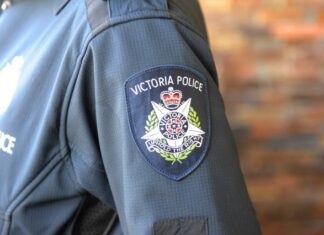Andrew Mathieson
AS A boy Simon Falkiner grew up on a parched patch during a time when farming would take from the land and give very little back.
Standing on top of greener pastures, the 44-year-old father can now proudly boast of wearing the environmental warrior tag.
Not that he’s protesting at the front gate or chained to a tree singing peace songs. Simon’s actually a pioneer of eco-farming since returning to a once-degraded 450-acre Moriac property in 2007.
“We (farmers) are now much more considerate of the environment, both ecologically and human-wise,” he points out.
“We realise the need to put a lot back into our farming systems so it becomes sustainable, which just wasn’t the way we were going.”
Simon talks about the role of custodian of the land and the “right to farm” with fingers making inverted comma movements. In his world of farming, chemicals are now on the nose and pesticides leave a bad taste in the mouth. Even rabbit-baiting programs have to grow increasingly dog friendly, he adds.
“It’s a lot less effective but we have to be good neighbours to the urban sprawl, so to speak,” Simon considers.
“At harvest time if you’ve got a hot night with a north wind blowing, that’s beautiful harvesting weather, but we’ve got to be considerate that somebody (downwind) might have a young baby.
“Fifteen years ago you would have ploughed on and not given it a second thought.”
The biggest battle is keeping weeds under control.
Gorse, an invasive shrub, had spread through the nearby Thompson Creek catchment area. But Simon explains how he’s winning the war against the invader through natural means.
“We’re putting old trees back and we’re putting belts of native grasslands back into our farming systems so there’s a home for the beneficial insects,” he says.
“In modern farming, if you plant a wheat crop it’s a bit like a pine plantation: it’s a monoculture and the pests come in quickly and easily.”
Living on the land is entrenched in Simon’s genes, even though he spent a year closer to the beaches of Barwon Heads.
The Falkiner family farmed property around Deniliquin for about five generations.
After selling up they moved to Moriac four decades ago, but Simon made his mark at Marcus Oldham College and worked out of Winchelsea in farm management.
When dad passed away and mum wanted to pack up for Melbourne, he packed it in and took his wife and kids back home.
They became involved in a new-age Grain and Graze research program and started up a consultancy research business on environmental issues.
“I wanted to work smarter rather than harder,” Simon says.
Still cropping half the farm and running sheep on the remainder, Simon likes to roll up his sleeves on the back of a tractor.
“We still want the farm side because I needed to get out, get my hands dirty and sniff some diesel and I can still do that – it’s my stress relief,” he jokes.
The move back to Moriac also led to a meeting with Dr Richard Freier, one of the world’s leading IVF cattle specialists. Together they introduced test tube calves to the district.
Simon says the frozen embryos give struggling farmers an extra option for breeding.
“We had a calf on the ground and its mother was a clone from a bull in America,” Simon recalls.
“It was thrown together in a test tube and we have a live, healthy calf out at Beeac at one of the cooperative farms.
“We thought it was pretty exciting because it was really leading-edge technology.
“There are not many cloned cattle out there.”
The green fields
Digital Edition
Subscribe
Get an all ACCESS PASS to the News and your Digital Edition with an online subscription
Man under police guard after hospital death
A psychiatric patient is dead and another is under police guard after an incident at a mental health facility plagued with controversy.
Homicide detectives are...








